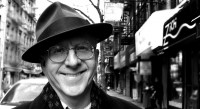Like other busy people I tend to read more during the summer, though rarely do I take on one big project (every Shax play, all of Musil’s The Man Without Qualities). Rather I read eclectically, impatiently or luxuriantly, in a hammock in sunlight or lying on the couch with a martini by my side and a ballgame on mute in the background. I read newspapers, magazines, manuscripts, poems, essays—and when I am lucky and have more than a few hours at my disposal, books, books, books—two or three at a time.
Here are several that I am (or have just finished) reading:
(1) Somerset Maugham’s Collected Stories, volume II. Vastly underrated at a time when narrative itself is distrusted, Maugham can teach you more about writing good prose than any manual. “The Alien Corn,” “The Force of Circumstance,” “The Creative Impulse” are three outstanding stories that flow so smoothly and are so gripping and so convincing in their particulars that only after a delay do you become aware of how profoundly each realizes the grand abstraction stated in its title.
(2) Jazz Singing: America’s Great Voices from Bessie Smith to Bebop and Beyond, by Will Friedwald. Having just finished a book on popular American song (A Fine Romance: Jewish Songwriters, American Songs), I happily find that my interest in the subject continues—and ramifies. Friedwald, author of a fine book on Sinatra, writes knowledgeably and knowingly about the whole range of vocalists from the golden age. He is a man of many opinions, and I wish he wouldn’t pass such severe judgment on the likes of Vic Damone and Bob Eberle. Still, every chapter is loaded with learning and insight, and love of the subject animates every page.
(3) Best of Times, Worst of Times: Memoirs of a Political Education, by Walter Lacquer. I am reading galleys of this book that Brandeis University Press will publish in December. Lacquer is a great historian, a throwback in several respects—he is reliable, writes clearly, is non-doctrinaire, has no restrictive idée fixe, and has lived and reported on the places he reports about. He is particularly smart on the Middle East, anti-Semitism, the fall of the Soviet Union, guerrilla warfare, and the relation of diplomacy to espionage.
AND perhaps because of the title of Lacquer’s book, I reread A Tale of Two Cities. What a treat, The pages flew until suddenly there were Miss Pross and Madame Defarge in mortal combat. The opening chapter is maybe the greatest “overture” in the history of the novel.
David Lehman is a poet, writer, and editor. He was elected to the board of the National Book Critics Circle, and served as vice president for programs, for five years starting in 1987; at the time he was reviewing books for Newsweek and other publications. He has published eight books of poetry, including Yeshiva Boys (Fall 2009), When a Woman Loves a Man (2005), The Evening Sun (2002), and The Daily Mirror (2000), all from Scribner. Lehman has edited The Oxford Book of American Poetry (Oxford University Press, 2006), The Best American Erotic Poems (Scribner, 2008), and Great American Prose Poems (Scribner, 2003), and other collections. His most recent nonfiction book is A Fine Romance: Jewish Songwriters, American Songs (Nextbook / Schocken, October 2009); his previous prose books include The Last Avant-Garde: The Making of the New York School of Poets (Doubleday), Signs of the Times: Deconstruction and the Fall of Paul de Man (Simon and Schuster), and The Perfect Murder (University of Michigan Press). Lehman has received fellowships and awards from the Guggenheim Foundation and the American Academy of Arts and Letters and has taught in the graduate writing program of the New School in New York City since the program’s inception in 1996. He initiated The Best American Poetry series in 1988 and continues as general editor of the annual anthology. He lives in New York City.


